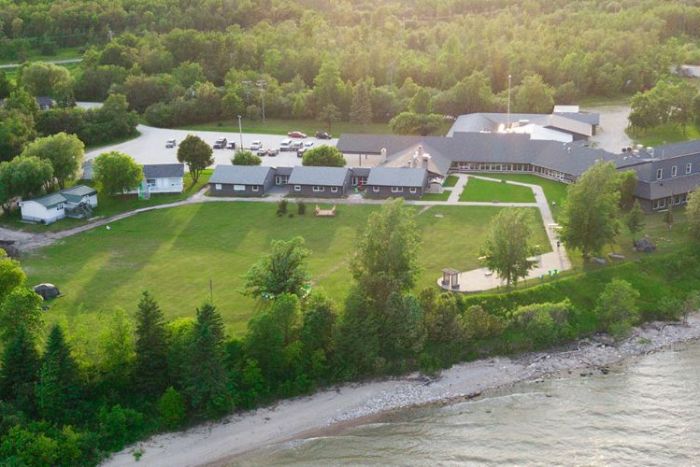Going to Family Therapy in Rehab



Hannah is a writer with a focus on holistic wellness. Her work explores post-traumatic growth and the connection between physical and mental health. In addition to writing for Recovery.com she has written meditations for NatureSpace and is a licensed massage therapist.




Hannah is a writer with a focus on holistic wellness. Her work explores post-traumatic growth and the connection between physical and mental health. In addition to writing for Recovery.com she has written meditations for NatureSpace and is a licensed massage therapist.
Substance use disorders don’t develop in a vacuum. They often develop due to genetics, trauma, or social pressures. Any of these factors may be caused by difficult family dynamics. Because of this, many people in rehab benefit from attending family therapy in rehab.
“Family” is a complex idea. For some people, it means only their family of origin, such as parents and siblings. Others use the term to refer to their spouses and children. Many people also have chosen families, which may include friends, collaborators, and even more complex relationships. And whomever you consider to be your family, you can be sure that your group dynamic is unique.
Depending on each specific family’s interpersonal relationships, commitment to healing, and availability, this type of therapy may or may not be a good fit. However, many people in recovery find it to be extremely beneficial.
Who Benefits From Family Therapy
When you first enter treatment, it may be difficult to disentangle your own behaviors from the behaviors of those around you. Many people benefit from traveling to rehab, putting both physical and emotional space between themselves and their loved ones while they begin recovery. Over time, you’ll likely reach a nuanced understanding of what caused your past behaviors. Through this process, many people with substance use disorders learn how to be accountable for their own behavior, without blaming themselves for the actions of those around them.
No matter what led you to misuse substances, it can be extremely helpful to examine the external and interpersonal circumstances of your life. This process empowers clients to make sustainable changes, with the goal of living a healthy lifestyle even when faced with challenging situations. By focusing on yourself, and staying in your lane, you can consistently make choices that support your own values.
The Person in Recovery
For many clients, family therapy is an essential component of recovery. As you learn more about the dynamics that enabled your past behavior, you’ll become better equipped to create more sustainable interpersonal relationships. This process can also help you come to terms with past traumas, such as growing up with an alcoholic parent, especially if those traumas were either shared with or caused by family members.
“Family work helps people achieve and maintain long-term emotional resolve and resilience.”
– Ameet Braich, Clinical Director, Camino Recovery

Significant data supports the idea that healthy family dynamics can help you commit to long-term recovery. Specifically, “Involving family members in substance use disorder (SUD) treatment1 can positively affect client engagement, retention, and outcomes. Positive social/family support is related to long-term abstinence and recovery, whereas negative social/family support (e.g., interpersonal conflict, social pressure to use) is related to increased risk for relapse”.
This modality not only helps clients do inner, emotional work; it can also be the first step in building a support network to help you navigate life after rehab. That network may ultimately include your family, friends, loved ones, and even work colleagues. Family therapy can help you bolster your closest relationships, giving you a strong base from which to cultivate a wider community.
One study on the effects of family therapy in addiction treatment2 found that “Family therapy enhanced family resilience, structure, and strong ties; the program improved problem-solving skills, coping skills, and family resiliency levels” of people with substance use disorders. Although this particular research focused on adolescents in recovery, the same theory may apply to adults in recovery. And these same skills may also improve the lives of the other people in your family.
Family of Origin
In most families, members play multiple roles at once. You might be a parent, a grandchild, and a spouse, all at the same time. These dynamics are always complex, even in the easiest and healthiest of circumstances. Family therapy is not only intended to help you heal; it’s also designed to help the people around you heal, and to heal the ways in which you relate to each other.
“Family members assume certain roles, which often relate to…cultural attitudes, family beliefs, gender, and overall family functioning. Some roles develop in response to stress or the underfunctioning of a family member.” When you attend rehab and begin recovery, the roles of your family members may begin to shift. Although this process can be extremely healthy, it can also be stressful and confusing. For example, if your spouse has learned to care for you in a certain way, you may no longer benefit from that specific kind of care. Family therapy creates a safe space in which you and your loved ones can process these changing relationships.
Loved Ones and Chosen Family
Not everyone considers their family of origin to be their family. And not everyone should. If your relationships with your original family were particularly traumatic or harmful, it can be healthy to surround yourself with people of your own choosing. Many rehab centers define this word much more broadly, inviting clients to focus only on loving and supportive relationships.
“‘Family’ means a group of two or more people with close and enduring emotional ties. Using this definition, each person in treatment for a behavioral health disorder has a unique set of family members. Therapists don’t decide who should be in family therapy. Instead, they ask, ‘Who is most important to you?’” By answering this question, clients can start to regain agency in their own lives. You have both the ability and the right to choose which relationships are healthy for you. Even before your loved ones start attending therapy, defining “family” for yourself may help you understand your core values and your deepest needs. “It is up to clients to identify whom they would like to include in family counseling.”3
Some rehab centers have a special focus on providing therapy for chosen families. In the LGBTQ+ affirming program at Caron Ocean Drive, for example, some clients may be estranged from their families of origin. The team at this rehab strongly believes that “family members, including people you identify as your family of choice, should be part of the treatment process. If you are dealing with rejection from your family because of your sexuality, our therapists can provide counseling for you and any family members you wish to include.”

However you define family, it’s likely that you can find a rehab program that can support you and your loved ones. Some rehab centers—especially those that offer personalized treatment—may work with you to create a specialized program that meets your exact needs, making family therapy as accessible as possible.
Making Family Therapy Accessible
Even if family therapy is the right fit for you, as an individual, it may or may not be accessible for your loved ones. This is especially true for clients who attend destination rehabs. When you’re located in a different city or country from your family, you may need certain accommodations in order to schedule group conversations. Fortunately, in this technological era, there are many options available.
Phone Calls
If family therapy sessions aren’t the right fit for you or your loved ones, you may still benefit from staying in touch. Some rehabs allow clients to use cell phones and other electronics to contact far-away family members.
Every program has its own regulations. In some facilities, you may have free access to your personal cell phone or computer throughout treatment. Others may allow you to schedule phone calls in advance. You may also be required to spend some time in therapy before you’re allowed to reach out to family, or to begin focused family therapy.
Virtual Family Therapy Sessions
Thanks to the growing popularity and accessibility of online medicine, you may be able to try family therapy even if your loved ones are far away. There are a number of HIPAA-compliant telehealth platforms4 that allow clients to safely meet with therapists, trusting that their conversations will remain private and protected.
Research suggests that virtual therapy may be just as effective as in-person therapy.5 David Mohr, Ph.D., director of the Center for Behavioral Intervention Technologies at Northwestern University’s Feinberg School of Medicine, asserts that “telehealth is essentially just as effective as face-to-face psychotherapy—and retention rates are higher.” However, since the popularity of this format has grown so quickly, there is still much we don’t know about its efficacy.
Some programs also offer telehealth options that are only available to families, in addition to family therapy with the client. All Points North Lodge, for example, hosts weekly virtual support groups for people with a loved one in recovery.

In-Person Family Therapy
If you attend rehab locally, you and your family may prefer to attend therapy together in person. This is an important option for people whose loved ones may not be comfortable using technology to discuss personal information, and those whose families include small children.
Many programs offer various versions of this modality, ranging from regular meetings to occasional visits. Aurora Recovery Centre offers a wide variety of robust programming for families, which people can attend either with a loved one in recovery or on their own. While these programs are therapeutic, they also share practical skills, teaching attendees “how family and community systems are affected by substance use disorder.” PROMIS London takes a different approach, hosting a family week during which your loved ones come together as a group for several days in a row.
Explore Trauma Treatment Centers
Benefits of Family Therapy
Because every family is unique, every family is affected by substance use disorders6 in a slightly different way. These conditions can easily influence “breakdown in the ways in which family members get along, communicate, and bond with each other. A family is a system consisting of different ‘parts’ (the family members), so a change in one part can cause changes throughout the system.”
Family therapy is intended to heal not just the involved individuals, but the whole system. This process may teach you and your loved ones how to better support each other through hardships, encourage each other to use healthy coping mechanisms, and engage in activities you all find meaningful. Rehab is, among other things, a time for you to get to know yourself again. And you may find that you’ve changed. Family therapy invites your loved ones to get to know you again, too.
“Although family counseling may temporarily shake up the family system and activate intense feelings, these feelings are a normal part of counseling.” This process isn’t easy. However, for many clients, it is an extremely important part of recovery.

Limitations of Family Therapy
There is no one-size-fits-all solution to healing from a substance use disorder. As helpful as family therapy can be, it may also be detrimental to certain clients. For example, some clients find that attending rehab—and especially traveling to rehab—is a helpful way to distance themselves from toxic interpersonal dynamics. In these cases, it may be better to take a break from communicating with loved ones until after you complete residential treatment.
In other cases, family therapy may be detrimental to a client’s loved ones. According to experts, “certain family members should not be included in SUD treatment and services. Such situations include when intimate partner violence has occurred, when child abuse or neglect has occurred, when individuals are currently withdrawing from substances, when clients with SUDs are also struggling with psychosis or are suicidal, and when clients have significant cognitive problems (like severe learning or memory problems).”
And even if you and your healthcare providers agree that family therapy would be beneficial for all involved, it may not be a realistic option. Your family may even be resistant to treatment,7 refusing to join you in the process of recovery. If this is the case, it’s best to focus on your own healing, and rely on your clinicians to provide you with more direct support. You may also benefit from attending support groups, and connecting with other members of your cohort.
Your Family and You
Family therapy is a way of healing not just your psyche, but also your relationships. By improving your communication skills, you’ll learn how to navigate stressful situations without losing much-needed interpersonal support.
It’s important to remember, though, that you are not your relationships. Working on your family dynamics can be extremely helpful. But regardless of their mental health, and regardless of their approval of your behavior, you have the right to be well. Whether or not you decide to attend family therapy, rehab is an opportunity for you to focus on your own personal healing process.
To learn more, view our collection of rehabs offering family programming.
Frequently Asked Questions About Family Therapy in Rehab
What is the role of family therapy in rehab?
Family therapy plays a vital role in addressing the impact of addiction on the family system. It promotes healing, communication, and understanding among family members. This process can teach members how to better support each other, building a foundation for lasting recovery.
How does family therapy benefit the addiction recovery process?
Family therapy benefits the addiction recovery process by fostering a supportive and healthy family environment. It helps identify and address enabling behaviors, improves communication skills, rebuilds trust, and provides a strong foundation for sustained sobriety and emotional well-being.
Who participates in family therapy sessions during rehab?
Family therapy sessions in rehab typically involve the person in treatment and their family members. This can include parents, siblings, spouses, and chosen family. The goal is to address dynamics within the family system and strengthen relationships for long-term recovery.
-
Substance Abuse and Mental Health Services Administration. (2021). The Importance of Family Therapy in Substance Use Disorder Treatment. Advisory.
-
Ulaş, E., & Ekşi, H. (2019). Inclusion of family therapy in rehabilitation program of substance abuse and its efficacious implementation. The Family Journal, 27(4), 443–451.
-
Substance Abuse and Mental Health Services Administration. (2021). The Importance of Family Therapy in Substance Use Disorder Treatment. Advisory. https://store.samhsa.gov/sites/default/files/SAMHSA_Digital_Download/pep20-02-02-016.pdf
-
Rights (OCR), O. for C. (2020, March 17). Notification of enforcement discretion for telehealth remote communications during the covid-19 nationwide public health emergency [Text]. HHS.Gov.
-
How well is telepsychology working? (n.d.). Https://Www.Apa.Org. Retrieved November 5, 2021, from
-
Substance Abuse and Mental Health Services Administration. (2020). Substance Use Disorder Treatment and Family Therapy. Treatment Improvement Protocol (TIP) Series, 39.
-
Van Deusen, J. M., Scott, S. M., Stanton, M. D., & Todd, T. C. (1980). Engaging “resistant” families in treatment. I. Getting the drug addict to recruit his family members. International Journal of the Addictions, 15(7), 1069–1089.
Our Promise
How Is Recovery.com Different?
We believe everyone deserves access to accurate, unbiased information about mental health and recovery. That’s why we have a comprehensive set of treatment providers and don't charge for inclusion. Any center that meets our criteria can list for free. We do not and have never accepted fees for referring someone to a particular center. Providers who advertise with us must be verified by our Research Team and we clearly mark their status as advertisers.
Our goal is to help you choose the best path for your recovery. That begins with information you can trust.






